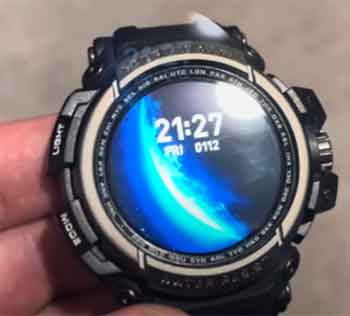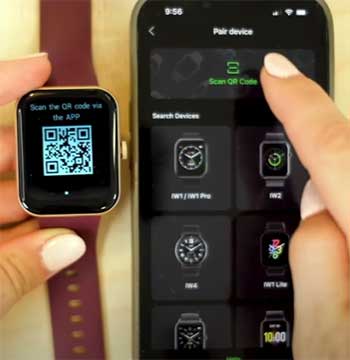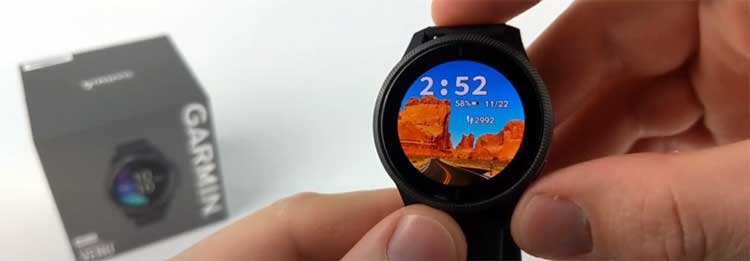If you’re in the market for a rugged smartwatch that can keep up with an active lifestyle, you might have stumbled across the Alpha Gear Delta smartwatch. It’s tempting—with its promise of durability, wellness tracking, and a battery that seems to go on forever.
But is it really worth the hype, or should we just look elsewhere?
Let’s unpack this together.
First Impressions of The Alpha Gear Delta Smartwatch
Right out of the box, the Alpha Gear Delta smartwatch gives you a sense of toughness. It’s not sleek like an Apple Watch or minimalist like a Fitbit. This one screams rugged—it’s built to look like it can survive an apocalypse.

You’ve got a thick aluminum alloy casing and a chunky wristband that makes it feel ready for extreme adventures.
But I have to admit, the design does come at a cost—it’s bulky, and not everyone will love the weight on their wrist.
The setup was surprisingly straightforward. It paired with my iPhone pretty seamlessly, and within a few minutes, I was already exploring all its features.
From sleep tracking to blood pressure monitoring, it’s got the usual bag of tricks that most fitness-oriented smartwatches have these days.
The screen is decent indoors, but when I tried using it outdoors on a sunny day, it felt like I was squinting at a blank slate. The brightness just doesn’t hold up well when facing direct sunlight.
Features of Alpha Gear Delta Smartwatch
- Wellness Tracking: Is It Reliable?
This is where things start to get interesting—or, more honestly, disappointing. The Delta smartwatch offers 24-hour wellness tracking that includes heart rate, blood pressure, sleep, and blood oxygen monitoring.
It all sounds promising, but when I put it to the test, I started noticing discrepancies. I’m not a medical professional, but I do like to keep an eye on my health metrics.
So, when I saw that my heart rate was being read as 55 beats per minute while I was doing a high-intensity workout, I knew something was off. It’s not just a one-time glitch either—it consistently reads low or provides questionable metrics.
If you’re looking for a reliable health companion, this might not be it. It’s great for giving you general data trends, but for accuracy, I wouldn’t take its readings too seriously. Compared to some of the bigger names in the smartwatch market, it’s just not there in terms of health tracking precision.
Apple Watch and Garmin devices are far more dependable when it comes to providing realistic data for health metrics.
- Sports Modes: A Mixed Bag
The Delta smartwatch comes with over 50 sports modes. I tried using it during a few different activities—running, cycling, and even a short hike. For running and cycling, it was fine in terms of logging basic data like time, steps, and approximate calories burned.
However, without GPS, it’s not going to provide precise information about distances covered or routes. You’ll be relying on rough approximations, and that’s not ideal if you’re serious about your workouts.
Also, for a watch that’s supposed to be rugged, the interface didn’t feel very intuitive when I was trying to change modes on the go. It’s a bit fiddly, and in the middle of an intense workout, the last thing you want is to struggle with getting the right mode activated.
- Durability and Build Quality

Durability is where the Delta smartwatch gets most of its brownie points.
The build is tough, and the aluminum alloy casing makes it feel like it could survive some pretty rough treatment.
However, it’s not all perfect—there have been some practical issues with the build quality.
The wristband pins, for instance, are poorly designed. I’ve read about other users losing these pins, and I’ve had my own issues with them loosening up.
If the band detaches during an activity, that’s a real problem—and finding replacement parts isn’t straightforward either.
In terms of waterproofing, it claims to withstand water exposure like rain or washing hands. However, I’m hesitant to test its limitations given how inconsistent the build quality seems to be.
The manufacturer explicitly advises against swimming or using it for longer periods in water, which makes me think that while it can take a few splashes, I wouldn’t trust it to hold up under a more serious test.
Pros And Cons of The Alpha Gear Delta Smartwatch
Pros
- Rugged Design: The aluminum alloy construction is impressive. It feels like a watch made for outdoor adventures.
- Battery Life: This is genuinely one of the better aspects. You can go up to 10-14 days without needing a charge, which is a massive plus compared to some watches that need daily charging.
- Variety of Watch Faces: The option to change watch faces from the app is nice, and it helps add a little customization.
Cons
- Inaccurate Health Tracking: The wellness tracking is hit or miss. It’s okay for giving you an idea of trends, but the inaccuracies make it unreliable for those who want precise data.
- Poor Wristband Quality: The pins are flimsy and tend to fall out easily, which is frustrating.
- Bulkiness: This watch is definitely not for someone looking for a lightweight, sleek design. It’s large and can feel heavy, especially during workouts.
- Screen Visibility: Screen brightness is lacking, making outdoor use a real challenge.
- No GPS: Lacking built-in GPS, it doesn’t offer much for runners or cyclists looking for accurate route tracking.
Comparison With Other Brands
- Alpha Gear Delta Vs. Letsfit E22 Smartwatch

The Letsfit E22 is a budget-friendly smartwatch that competes directly with the Delta in terms of offering fitness tracking and long battery life.
The E22 is considerably lighter and more comfortable to wear for extended periods.
Its wellness features, such as heart rate monitoring and sleep tracking, are similar to those of the Delta, but it lacks the rugged build quality.
However, it outperforms the Delta when it comes to value for money, as it provides reasonably accurate tracking and a sleek design at a much lower price point.
For users who prioritize comfort and affordability over ruggedness, the Letsfit E22 is a better option.
- Alpha Gear Delta Vs. Luxium Crusader Watch

The Luxium Crusader Watch is another contender in the rugged smartwatch category. In terms of aesthetics, the Luxium Crusader has a more refined, tactical look, making it feel less bulky compared to the Delta.
It also features a better wristband design, which avoids the pin issues that the Delta has. While both watches offer fitness tracking, the Crusader includes a more intuitive interface and better screen visibility under different lighting conditions.
The Crusader also boasts a waterproof rating that is more reliable than the Delta, allowing for swimming without worry. Overall, the Luxium Crusader stands out for its improved build quality and better usability, making it a stronger choice for those seeking a rugged smartwatch.
- Alpha Gear Delta Vs. Garmin Venu Smartwatch

The Garmin Venu is in a different league altogether when it comes to smart features and overall quality. Unlike the Delta, the Garmin Venu comes with built-in GPS, making it an ideal choice for runners, cyclists, and outdoor enthusiasts who need accurate activity tracking.
The Venu also offers a much more vibrant AMOLED display, which is visible even in bright sunlight, something the Delta struggles with. Garmin’s health metrics are also more precise, offering features such as heart rate variability, stress tracking, and Pulse Ox, all of which are highly reliable.
The trade-off is the price—the Garmin Venu is significantly more expensive. However, if you’re looking for a watch that can provide accuracy and high-end features without compromising on aesthetics, the Venu is the way to go.
When comparing the Alpha Gear Delta smartwatch to the Letsfit E22, Luxium Crusader, and Garmin Venu, it becomes clear that the Delta’s main strengths are its rugged design and long battery life.
However, it falls short in terms of health tracking accuracy, GPS availability, and overall usability. If you’re on a budget, the Letsfit E22 is a good choice. For better durability and user experience, the Luxium Crusader is preferable.
And if you’re looking for a more sophisticated smartwatch that delivers top-notch accuracy and features, the Garmin Venu is well worth the investment.
Maintenance Tips For Your Alpha Gear Delta Smartwatch
To keep your Alpha Gear Delta smartwatch in the best condition, here are some tips that will help prolong its lifespan:
- Avoid Submersion in Water: Even though the Delta smartwatch is rated for some water exposure, I wouldn’t push its limits. Avoid submerging it in water, and definitely don’t take it swimming.
- Handle the Wristband with Care: The wristband pins are a weak point. Make sure they are firmly in place before wearing the watch. If they become loose, address it immediately to avoid losing the pins.
- Regular Cleaning: Given the rugged design, it’s likely you’ll wear this watch in dusty or dirty environments. Wipe down the casing and the band regularly to prevent buildup of dirt, which could eventually cause damage.
- Battery Care: The Delta has a long battery life, but it’s still a good idea to charge it before it’s completely dead. Try to avoid letting it go to zero often, as this can wear out the battery faster over time.
- Software Updates: Keep an eye out for firmware updates on the app. Software improvements can often help with some of the performance issues you might be facing, particularly with health tracking accuracy.
Frequently Asked Questions (FAQs)
The Delta smartwatch has its pros and cons. It’s rugged and has great battery life, but its health tracking isn’t reliable, and the bulky design isn’t for everyone. If durability is your main focus, it’s decent, but for health features and precision, there are better options.
The watch is water-resistant to an extent, meaning it can handle rain, handwashing, and possibly a quick dip. However, it’s not recommended for swimming, diving, or prolonged exposure to water.
No, the Delta smartwatch does not have built-in GPS. This is one of the major drawbacks if you need accurate distance tracking for activities like running or cycling.
The most reliable smartwatch depends on what you value most. For all-around health tracking, user-friendly features, and integration, the Apple Watch Series 8 is top-notch. If rugged durability and GPS tracking are key, Garmin Instinct is one of the most reliable options out there.
Wrapping Up
The Alpha Gear Delta smartwatch might catch your eye with its rugged design and great battery life, but when it comes to health tracking and ease of use, it’s not the best on the market.
There are better alternatives out there that offer more accurate features and overall better value for your money.
